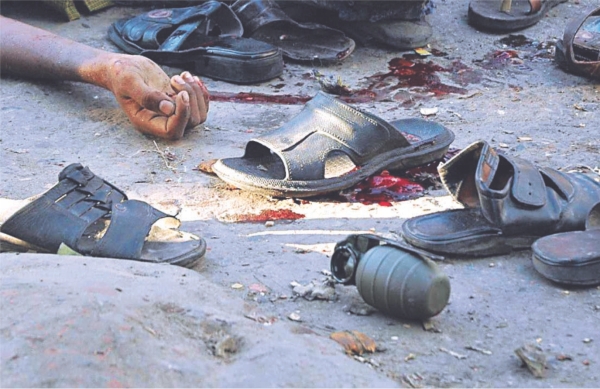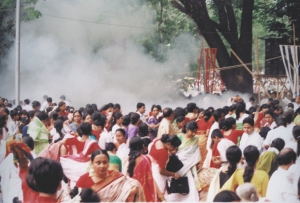| Home - Back Issues - The Team - Contact Us |
 |
| Volume 11 |Issue 17 | April 27, 2012 | |
|
|
Politics
A Tale of Two Parties Groups with extreme political agenda might try to take advantage of the current political quagmire Ahhmede Hussain
Violence looms large in Bangladesh's political horizon. With the disappear-ance/enforced disappearance of Ilias Ali, the country's politics has suddenly turned volatile, and there is every reason to believe that certain elements in the society, the extremist ones in particular, might try to take advantage of the situation with the aim of destabilising it to further their agenda. In fact, Ilias's disappearance/ enforced disappearance has taken place at an interesting juncture of our time. Jamaat-e-Islami and some of its leaders are facing charges of war crimes they are alleged to have committed during the country's fight for freedom in 1971. Also hanging in fine balance is the political future of Tarique Rahman, who, if proven guilty in the cases that he is facing, might have to shelve his dream of becoming the country's prime minister. And the Awami League (AL) government is not in a good shape either. Some recent sensational murders and dacoities and the law enforcing agencies' failure to unearth the mysteries behind them have put the government's credibility in question. The list of such failures is actually getting longer. Murders of journalist couple Sagar and Runi and Saudi embassy official Khalaf Al Ali have created a sense of panic among the ordinary people. The investigation into the brutal murder of Sagar and Runi is a case in point. At one point into the probe, the home minister has declared that the prime minister herself is monitoring the investigation, and a few days later we have got to know from a Detective Branch official that his office has failed to make any significant breakthrough into the murder. Add to that the numerous incidents of robbery, theft and mugging that have been plaguing the country, especially its capital. It doesn't bode well for the government. Spiralling prices of essentials and power outages are enough to put any government in the back foot and to make matters worse is the arrival at the scene, of Omar Faruq Talukder, the beleaguered former Rail Minister Suranjit Sengupta's Assistant Personal Secretary, with a microbus-full of cash.
Suranjit dilly-dallying in resigning and his long, verbose statements before the media about his chequered political career has not helped. The minister, whose son Soumen, who, as a private professional with a monthly salary of around Tk 50,000 has paid the telecom regulator Tk 5 crore a few days ago, finally resigned and, the following day, to everyone's surprise, he was made a minister without portfolio. The government has also failed to properly handle the Grameen Bank affair, frustrating many of its supporters and angering the others. The Padma bridge project has remained in a limbo, and allegations of graft surrounding the proposed bridge have put a blemish in the government's image. The last in a long line of this sordid saga is the relinquishing of his parliamentary membership by Sohel Taj, a young Awami League leader, who at the beginning of the Sheikh Hasina's second term in office, also resigned from the cabinet. The prospect of a smooth transition of power, especially the fate of the Caretaker Government, also remains uncertain. The AL government, which enjoyed a two-third majority in the last parliamentary elections, is facing the most difficult times in the last three and a half years of its power. When a popular government loses its grip on power and constitutional institutions are weakened, evil forces always try to creep in. Our recent political history is littered with such instances. At the fag end of the AL's last term in power, several otherwise little known terrorist groups started to plant bombs in public places, killing and injuring many. History repeated itself a few years later during the Bangladesh Nationalist Party's (BNP) last term in office. Taking advantage of the BNP leadership's kleptocracy and misrule, extremist groups such as Harkat-ul-Jihad (Huji) and Jamaat-ul-Mujaheedin Bangladesh (JMB) had spread its tentacles under the shadow of the very establishment they professed to overthrow. The government and the Rapid Action Battalion (Rab) have so far been successful in busting the dens of the terrorists: most of the Huji and JMB leaders have been put behind bars. Some foreign sleeper cells of these groups are now dismantled, and the law enforcing agencies have arrested some Pakistani nationals who have been living in the capital to carry out their hideous plans. But as the law and order situation has deteriorated sharply and the focus of these agencies has shifted onto a different direction, there are chances that these groups might be able to regroup and spring a nasty surprise on us. The government needs to deploy members of law enforcing agencies to important establishments such as railway stations, airports and the Jamuna Multipurpose Bridge. Bangladesh's biggest strength in fighting terror, however, is its own people. Be it the arrests of Abdur Rahman or Siddique ul-Islam (Bangla Bhai), the ordinary people of this country has always been at the forefront of fighting terror. Bangladeshis love their religion, their belief is close to their hearts, and they know it for sure that there is no place for violence and extremism in it. Time and again, people have provided the law enforcers with information, based on which most of the terrorists have been arrested. At a time when political forces are squabbling over power, people need to remain vigilant, lest any violent, extremist group try to take the nation for a ride. Both the major parties should also sit together to find a way out of the mess that they have put the nation in. It is unclear under what circumstances BNP leader Ilias Ali disappeared/ forced to disappear. The AL needs to understand that such incidents tarnish the government's image and give a blow to the sense of security that it says prevails in the country. It must find a way to sit with the main opposition to talk about the most pressing issue that the country's politics is facing now–the type of government under which the next general elections is going to be held. Both the major parties must not forget that their bitter, acrimonious relationship has given birth to many an unfortunate incident in the past, and the future that is staring at us at this crucial juncture of history doesn't look at all bright either.
Copyright
(R) thedailystar.net 2012 |


